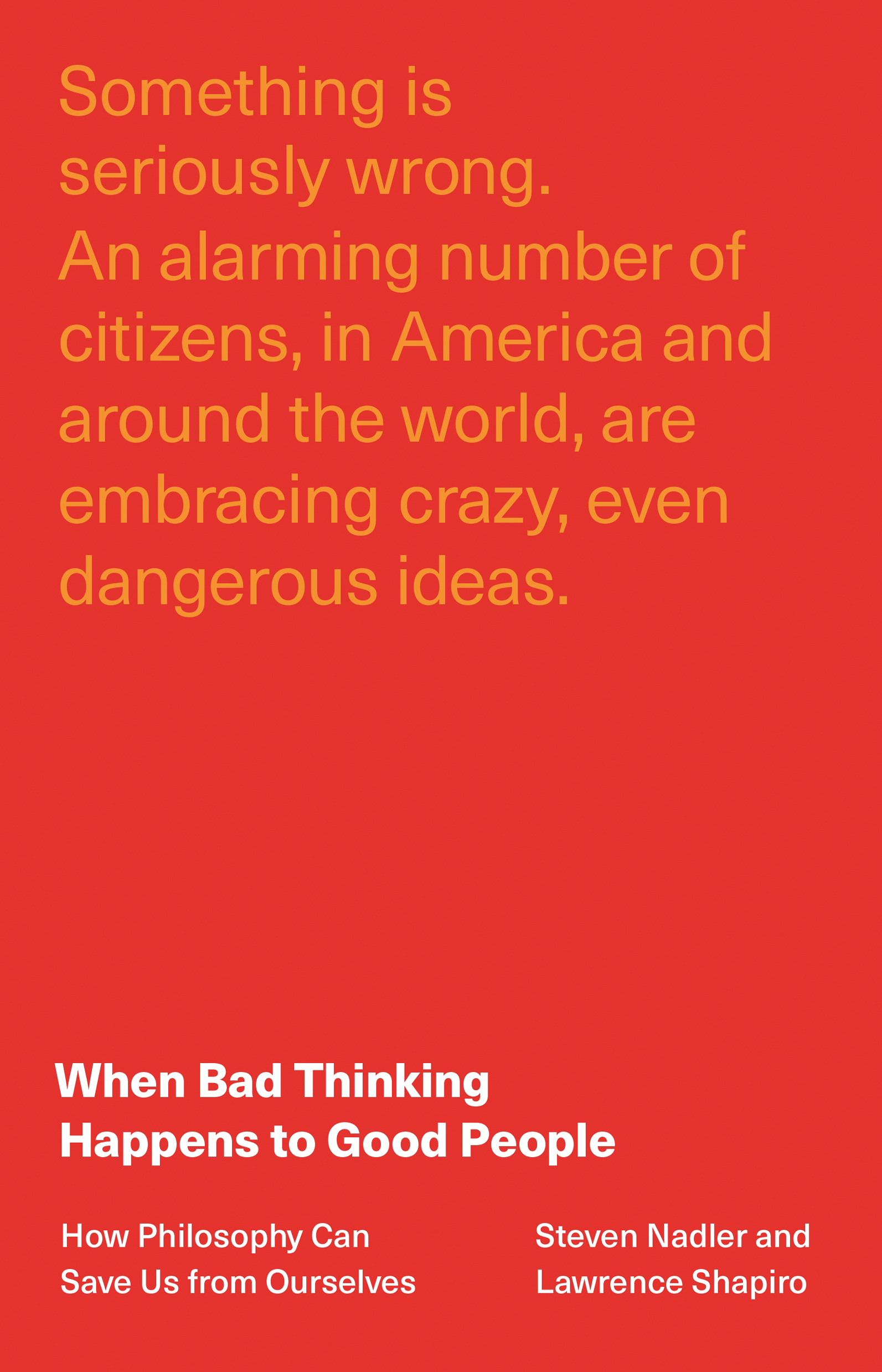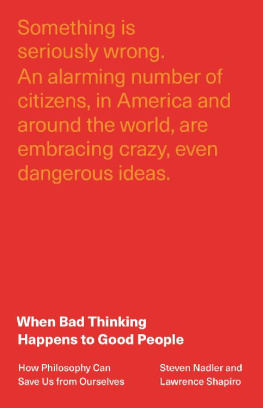When Bad Thinking Happens to Good People: How Philosophy Can Save Us from Ourselves
Here you can read online When Bad Thinking Happens to Good People: How Philosophy Can Save Us from Ourselves full text of the book (entire story) in english for free. Download pdf and epub, get meaning, cover and reviews about this ebook. year: 2021, publisher: Princeton University Press, genre: Religion. Description of the work, (preface) as well as reviews are available. Best literature library LitArk.com created for fans of good reading and offers a wide selection of genres:
Romance novel
Science fiction
Adventure
Detective
Science
History
Home and family
Prose
Art
Politics
Computer
Non-fiction
Religion
Business
Children
Humor
Choose a favorite category and find really read worthwhile books. Enjoy immersion in the world of imagination, feel the emotions of the characters or learn something new for yourself, make an fascinating discovery.

When Bad Thinking Happens to Good People: How Philosophy Can Save Us from Ourselves: summary, description and annotation
We offer to read an annotation, description, summary or preface (depends on what the author of the book "When Bad Thinking Happens to Good People: How Philosophy Can Save Us from Ourselves" wrote himself). If you haven't found the necessary information about the book — write in the comments, we will try to find it.
Unknown: author's other books
Who wrote When Bad Thinking Happens to Good People: How Philosophy Can Save Us from Ourselves? Find out the surname, the name of the author of the book and a list of all author's works by series.
When Bad Thinking Happens to Good People: How Philosophy Can Save Us from Ourselves — read online for free the complete book (whole text) full work
Below is the text of the book, divided by pages. System saving the place of the last page read, allows you to conveniently read the book "When Bad Thinking Happens to Good People: How Philosophy Can Save Us from Ourselves" online for free, without having to search again every time where you left off. Put a bookmark, and you can go to the page where you finished reading at any time.
Font size:
Interval:
Bookmark:

When Bad Thinking Happens to Good People
When Bad Thinking Happens to Good People
How Philosophy Can Save Us from Ourselves
Steven Nadler
Lawrence Shapiro
PRINCETON UNIVERSITY PRESS
PRINCETON & OXFORD
Copyright 2021 by Steven Nadler and Lawrence Shapiro
Princeton University Press is committed to the protection of copyright and the intellectual property our authors entrust to us. Copyright promotes the progress and integrity of knowledge. Thank you for supporting free speech and the global exchange of ideas by purchasing an authorized edition of this book. If you wish to reproduce or distribute any part of it in any form, please obtain permission.
Requests for permission to reproduce material from this work should be sent to
Published by Princeton University Press
41 William Street, Princeton, New Jersey 08540
6 Oxford Street, Woodstock, Oxfordshire OX20 1TR
press.princeton.edu
All Rights Reserved
ISBN 9780691212760
ISBN (e-book) 9780691220086
Version 1.0
British Library Cataloging-in-Publication Data is available
Editorial: Rob Tempio and Matt Rohal
Production Editorial: Mark Bellis
Text Design: Karl Spurzem
Jacket Design: Amanda Weiss
Production: Erin Suydam
Publicity: Maria Whelan and Amy Stewart
Copy Editor: Beth Gianfagna
- vii
We would like to express our gratitude to the wonderful editorial, production, and marketing teams at Princeton University Press, with special thanks to publisher Rob Tempio and associate editor Matt Rohal. We wanted to write a philosophical book that would be accessible to as broad an audience as possible, in the hope that it may do some good, and the encouragement, support, and expertise they offered us in our endeavor is greatly appreciated.
We are especially grateful to the many friends and colleaguesphilosophical and otherwise, too many to namewho not only lent a patient ear as we developed our thoughts but also offered many useful questions, comments, and suggestions. Apparently, irrationality is an easy topic on which to engage people. Even the most casual conversationsmany of which took place during long days in the saddle bicycling through the rolling hills of the Driftless Region of Wisconsinwere, in a time of medical, political, and environmental crisis, an invaluable opportunity to work through our ideas and gain new perspectives on reasonable and unreasonable thinking and behavior. Finally, special thanks to Elliott Sober, for his insightful reading of some of the chapters, and to our agent, Andrew Stuart, for helping us find the perfect home for the book.
When Bad Thinking Happens to Good People
Something is seriously wrong. An alarming number of citizens, in America and around the world, are embracing crazy, even dangerous ideas. They believe that vaccinations cause autism. They reject the scientific consensus on climate change as a hoax. They think that hordes of criminals (murderers and rapists, in the words of some politicians) are invading the United States through its southern borders. They blame the emerging 5G network for the spread of COVID-19. A growing movement of conspiracy theorists under the banner of QAnon espouses the idea that prominent politicians and movie stars are involved in a cannibalistic pedophile ring. Meanwhile, so-called Birthers continue to insist that the presidency of Barack Obama was illegitimate because he was not a natural born citizen of the United States. At the same time, a shockingly high percentage of American citizens continue to believe that Donald Trump really won the 2020 presidential election.
There is nothing to substantiate these beliefs, and easily available evidence shows that they are actually false. And yet, peopleoften educated, smart, and influential peoplecontinue to believe them. The New York Times columnist and Nobel Prizewinning economist Paul Krugman has called them zombie ideas: they continue to circulate despite being dead, disproven, and refuted. Even more troubling, the people who believe these things advocate for public policies that reflect their madness and vote for politicians who (whether they share those beliefs or not) promise to enact them. Especially remarkable is how these people come to hold beliefs and defend corresponding policies that, in fact, are contrary to their own best interests.
These are instances of bad thinking. Examples can be multiplied and internationalized. Elections, referenda, policies, and movements, not to mention actions both innocent and criminal, in numerous countries around the world, testify to an epidemic of bad thinking. Our focus, however, will be on the country we know best and the citizens among whom we live and work.
In this book we explain why bad thinking happens to good people. We consider why so many people can go so wrong in their beliefs and, consequently, in their actions. The way they come to form and defend these opinions is wrong, and their failure to appreciate the moral consequences of acting on them is wrong. The philosophical subjects of epistemology, which addresses how beliefs become justified and how knowledge differs from mere belief, and ethics, the study of the moral principles that ought to govern our behavior, can help us understand the difficult and perilous situation in which we now find ourselves. We also suggest a way forward, away from all this madness, through the tools of philosophyits questions, its methods, and even its millennia-old history of recommendations for how to lead a good, rational, and examined life.
A simple, if somewhat brutal, diagnosis of the current state of affairs in America is this: a significant proportion of the population are not thinking reasonably and responsibly. The real problem is not that they lack knowledge, education, skill, or savvy. Acting on incomplete knowledge or without the requisite skills can doubtless lead to disagreeable consequences. However, a person who does so might be blamelessmorally blameless, if she really could not have done otherwise, and even epistemically blameless, if she could not possibly have known better. We often have no choice but to act in ignorance of all the facts, the knowledge of which may be beyond our grasp, or when not adequately trained to meet a particular challenge. Similarly, we wish to distinguish what we are calling bad thinking from being unintelligent. Unintelligent people, who simply cannot figure out what to do or how to do it, no less than ignorant or unprepared people, might choose actions that end up doing more harm than good. But, like the ignorant or unprepared, unintelligent people might be blameless for their witless deeds. Few people, if any, are unintelligent by choice, and so blaming them for ill-conceived actions is often inappropriate.
On the other hand, bad thinking, as we understand it, is a character flaw deserving of blame. Unlike ignorance or lack of intelligenceand bear in mind that even very smart, capable, and highly educated people can think badlyit is generally avoidable. People who think badly do not have to think badly. They may beor, at least, should beperfectly aware that they are forming and holding beliefs irrationally and irresponsibly, and even doing so willfully. But they typically refuse to take the steps that would cure them of their condition. Some philosophers and psychologists have insisted that we really have very little control over what we believe, that the process of belief formation is not some voluntary process under the control of the will. Perhaps this is true for some of our beliefs, but it seems obviously
Font size:
Interval:
Bookmark:
Similar books «When Bad Thinking Happens to Good People: How Philosophy Can Save Us from Ourselves»
Look at similar books to When Bad Thinking Happens to Good People: How Philosophy Can Save Us from Ourselves. We have selected literature similar in name and meaning in the hope of providing readers with more options to find new, interesting, not yet read works.
Discussion, reviews of the book When Bad Thinking Happens to Good People: How Philosophy Can Save Us from Ourselves and just readers' own opinions. Leave your comments, write what you think about the work, its meaning or the main characters. Specify what exactly you liked and what you didn't like, and why you think so.

